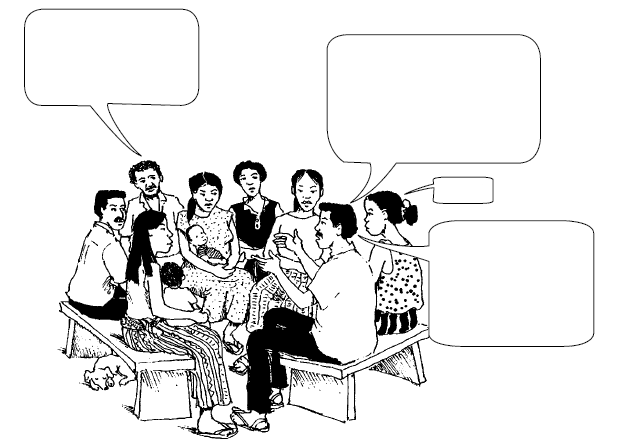Hesperian Health Guides
Testing parents and pregnant women
HealthWiki > Helping Children Live with HIV > Chapter 8: How to know if your child has HIV > Testing parents and pregnant women

In areas where many people have HIV, it is a good idea for all adults and children to get an HIV test. If you are sexually active, getting tested once a year or whenever you have a new partner is smart. If you have a child who is ill, you and your child can be tested at the same time, so treatment can start as quickly as possible if either of you has HIV.
If you are partnered and hoping to have children, you can be tested for HIV to learn how to protect your own health, your partner’s health, and the health of any children you will have. If you do not have HIV, you can take care to prevent being infected going forward. And if you do have HIV, you can start treatment, which protects your own health and that of your partners.
A pregnant woman should get tested for HIV as soon as possible. If you learn you have HIV, taking ART will protect your health and prevent your baby from getting HIV. You may be tested several times during pregnancy so if you become infected, you can start treatment right away to protect both yourself and the baby.

Test results for parents
If your HIV test is positive, the health worker will tell you and give you a few minutes to react. People have many different feelings, thoughts, and questions when they find out they have HIV. Often they do not believe the test, or are afraid or angry, or are relieved to know, or begin to worry about what will happen to their children. Sometimes they have no feelings at all, only emptiness. Any first reaction is just the beginning. People’s feelings change over time as they learn more about how to live with HIV.

Sometimes the health worker will order a second HIV test to be sure about the result. Be sure you know when to come back for the second test results. Ask a friend to give you support and help you remember.
When a parent has a positive HIV test, it is usually wise to have the sexual partner and any children tested for HIV too. This is most important for any young children in the family.
You might assume that if you have HIV, your partner must also have it. But this is often not true. Although HIV spreads easily through sex, it does not always. In many couples, one person has HIV while the other does not get infected for some time. An HIV test will help you know for sure.
Do not struggle alone with the news. Counseling, treatment, and support can all help. If you have questions or concerns about your diagnosis or treatment, discuss them with your counselor or health worker. Talk to a trusted friend or supportive family member who knows you well. Seek out a support group to meet others in your community who have HIV or who are parents with HIV. For information about HIV treatment, see Chapter 11.
You will also need to decide what to tell your children about your HIV infection, and what to tell your partner if you got tested alone. For how to talk to children about HIV, see Chapter 5.

If your HIV test is negative, it means there are no HIV antibodies in your blood. If you also have no risk of a recent infection, this means you do not have HIV.
Because antibody tests may not find a recent HIV infection, you may be asked if you have any risk of infection within the last couple of months, for example, if you had unprotected sex within 1 or 2 months of the test. Because you could be infected with HIV but not have enough HIV antibodies to make the test react, you should plan on taking another HIV test in another month or two (and use safer sex, including condoms, in the meantime).
If you are pregnant and your test is negative, you may be asked to test again in a few months. If your new test is positive, you can start ART quickly, to treat yourself and protect the baby.


